The GNU Gremlin is a badass volume-shifted, all-mountain freeride board. It’s great for someone looking for a deck that floats in powder, locks into a turn, and can still launch you off jumps and side hits.
But if you’re like me here on the East Coast, what happens when you don’t get many powder days? Is this board still worth it on the East Coast ice?
Let’s find out.

My Highlights of Riding the GNU Gremlin
- The Gremlin carves phenomenally well and feels stable in all conditions.
- It’s great on ice, hardpack, and rougher terrain.
- It’s a cruisy pow board.
- It’s decent for hitting small to medium-sized jumps.
- It’s a damp, smooth-feeling ride.
Board Reviewed: 155 GNU Gremlin 2025
Price of Board: $579.99
How the Price Compares to Others:
The GNU Gremlin costs $36.16 more than the average snowboard price of $543.83.
Our Rating Score: 4.375 out of 5
How the GNU Gremlin Ranks Against Others:
Ranks 14th out of the 37 boards reviewed in the all mountain category.
Pros:
- Locks into turns even on very icy terrain
- Damp enough to power through choppy conditions
- Forgiving camber profile that gives both power and pop
- Made in the USA, quality craftsmanship with a one year warranty
- $120 cheaper than the more popular Lib Tech Orca
- Soft nose can press and butter nicely, while a stiffer tail boosts you.
- Fast base has a nice consistent glide to it, and it’s easily repairable with black ptex
Cons:
- Not Very Beginner Friendly —This board is too big for beginners or more casual riders. The Gremlin can feel aggressive and catchy, so it’s better for intermediate and advanced riders.
- Plain Graphics — This year’s version of the board doesn’t have much in the way of Graphics with a plain purple topsheet and black base. (You get it more because it rips than looks like it rips.)
How Good is the Edge Hold on Ice?
I had the chance to test the GNU Gremlin in Stratton, VT, during an early February 2025 demo event. The conditions were a total nightmare. It was 9°F. Vertical sections of straight ice mixed in with longer sections of frozen chunder balls of ice.

Now, here’s the really cool part.
This board powered through icy terrain and chunder like a champ.
And here’s why.
The GNU Gremlin features Mervin Manufacturing’s Magne-Traction edges. This means the board’s edges are serrated, similar to a steak knife, and that adds in five additional contact points (seven in total) that run the entire length of the Gremlin’s edge.
How Magne Traction Helps With Gripping Ice
The deepest Magne-Traction serrations are located along the snowboard’s edge, right between the rider’s feet. This section of the serrated edge maximizes grip on ice because, as the board’s camber profile engages during a turn, the center of the profile flattens, and these five deeper serrations dig in, creating multiple saw-like cuts as they pass over the ice.
Review Rating
Before we get into the nitty-gritty, let’s take a quick look at the review scores.
HTML| Considerations | Rating Out 5 | Score Out of 100 | Weight / Importance to Score |
|---|---|---|---|
| Resort Riding / Versatility | 4.50 | 90 | 10 |
| Pop / Power | 4.25 | 85 | 10 |
| Powder | 4.25 | 85 | 5 |
| Carving / Turns | 5.00 | 100 | 10 |
| Responsiveness | 4.50 | 90 | 10 |
| Speed | 4.00 | 80 | 10 |
| Ice / Poor Conditions | 5.00 | 100 | 10 |
| Switch | 3.00 | 60 | 5 |
| Jibs | 3.25 | 65 | 5 |
| Jumps | 4.25 | 85 | 10 |
| Dampness | 4.75 | 95 | 5 |
| Buttering | 4.25 | 85 | 5 |
| Fun to ride | 5.00 | 100 | 5 |
| Weighted Score | 4.375 | 87.5 | 100 |
- Overall Rating: 4.375 / 5
- Score out of 100: 87.5 /100
- Category: All Mountain, Volume Shifted, Freeride
Our Rating:  87.5 out of a possible 100 or 4.3 out of a possible 5 review score for the GNU Gremlin Snowboard 2025.
87.5 out of a possible 100 or 4.3 out of a possible 5 review score for the GNU Gremlin Snowboard 2025.
Actual Feel of the Flex
GNU rates the Gremlin at a 6/10. I’d say it feels a little softer than that on snow.

To me, the board felt closer to a 5.5 / 10 overall flex rating. The nose is noticeably softer than the tail, where I would rate the nose at a 4.5/10 and the tail at a 6/10 flex. The nose’s flex pattern begins to stiffen up right after your front foot.
Torsionally, from toe to heel, this board is also a bit stiffer, at a 6/10 flex.
The main note on the flex for jibbing and buttering is that the Gremlin is noticeably easier to nosepress than tailpress. You get used to the difference patterns within a few runs, though.
How Good is the GNU Gremlin at Carving?
I have three main notes about my carving experience with the Gremlin.
- It’s the type of wide volume shifted board that feels stable enough to charge aggressively with, and it powers through all types of conditions.
- While it is an aggressive badass of a board, it is also very maneuverable, forgiving, and can off a cruisy laid back ride, too.
- The board’s level of edge hold is fantastic. You’ll feel locked into your turns, and that will allow you to ride it a bit more confidently at speed. Basically, it’s the type of board that helps you level up your game.

For me, the GNU Gremlin felt like a total carving badass. Whatever sort of junky conditions I needed it to ride through, it did. I was actually surprised by that, too. The Gremlin is shaped with a long nose, tapered tail, and a setback stance – these are features that help the board float in powder and not necessarily charge through ice and hardpack. It all seems to work together beautifully and make the Gremlin one of the most versatile boards, though.
The Gremlin has a very fun carving experience that I’d describe as cruisy yet still responsive, precise, and controlled.
While the board is aggressive, it’s still very approachable and maneuverable when you need it to be. You can still steer this board with your front foot when you need to. With the highest point of the c3 arc being flattened, there is a sweet spot torsionally just after your front foot that you can steer it from. This adds to the board’s turning capabilities. So while its sidecut is built for medium-sized carves through groomers and pow, this board’s right at home making tight, quick carves through trees, too.
Its edge hold is its carving highlight for us East Coast riders, though. This board felt completely in control no matter how icy or rough the conditions got.
I found that the Gremlin’s Magne-Traction really helped me lock into turns and avoid washing out in all types of conditions, too. The multiple contact points added in an extra level of stability than what I tend to feel with a standard continuous edge (at least on ice and hardpack we got on the East).
How Does the GNU Gremlin Perform in the Park?
The GNU Gremlin isn’t specifically designed to be a park board. However, it can handle your park laps, too.

I’d say the board is a little better at jumping than it is at jibbing, but it can hold its own on rail features, too.
Jumping
This board has a stiffer, snappy tail, and that becomes useful when launching off jumps and side hits. I’d say the pop out of the tail is around 15% above average, and the pop out of the nose is average.

The Gremlin was a great board for hitting small to medium sized jumps and practicing my spins. I found that the volume shifted (shorter and wider) shape helped make the board feel more maneuverable in the air while making my landings feel a little more forgiving. There’s something about having a little more material under your toes and heels that makes it more stable to land on. Simply spot your landing and put it down.
Jibbing
The Gremlin is an average jibber. Its camber between the feet and medium flex allows the board to easily mold around the feature.

The softer nose made nose pressing a little easier, but the tail isn’t as easy to press down into a tail press. The different flex patterns can get in the way of your more technical presses.
Buttering
Just like with jibbing, the tail requires you to put some effort into it, while the long, soft nose allows you to butter easily.
Dampness and Ride Feel
The GNU Gremlin is noticeably damp, which is a massive benefit for us East Coast riders. When I was riding over an ungroomable mess of ice chunder, I barely felt the vibrations under my feet.

This board did an excellent job with absorbing vibrations. It feels like a smooth riding higher end board. Basically, I never felt like I was getting bucked around.
Speed of the Base
The speed of the base has an above-average feel to it. I’d say it offers around 10% more speed than the average deck. It isn’t the fastest base I’ve ever been on, and it’s far from the slowest, either.
The speed of the base held up well through the flat sections and had more than enough speed for me to get me everywhere I needed to go or charge as quickly as I wanted to.
One really nice benefit of this all-black, knife-cut, sintered base is that it will be easy to add some black P-tex if you ever get a gouge or scratch. Simply fill the damaged spot and keep going.
Image Gallery from the Review
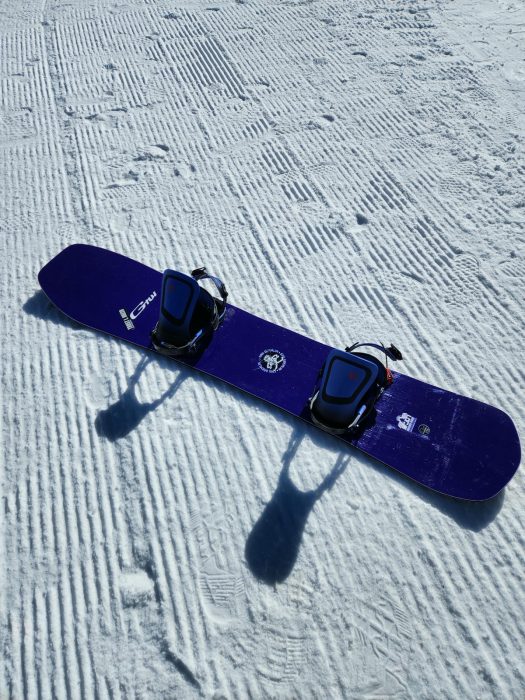
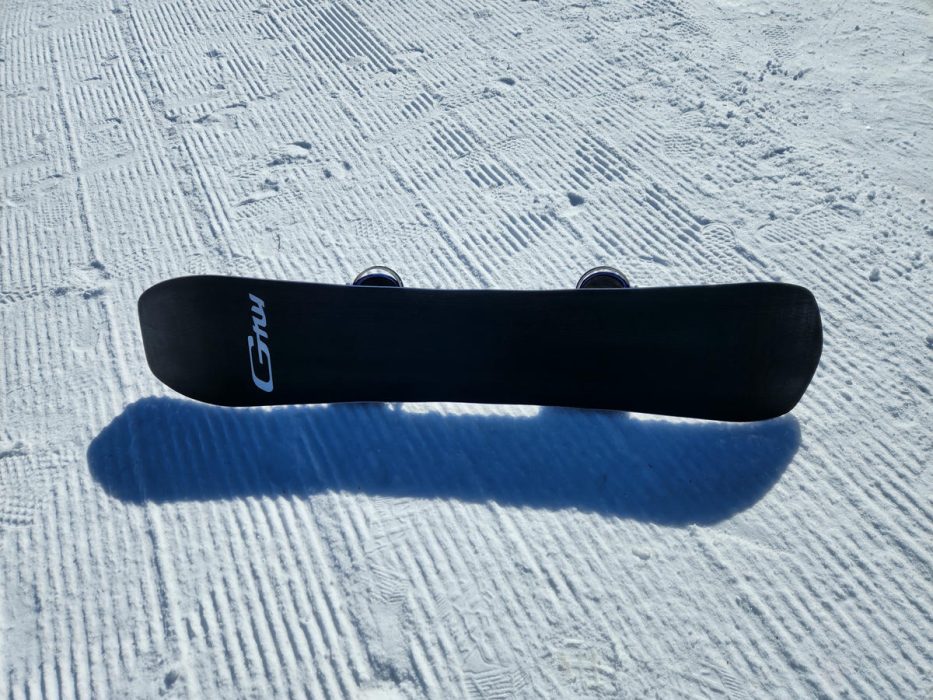
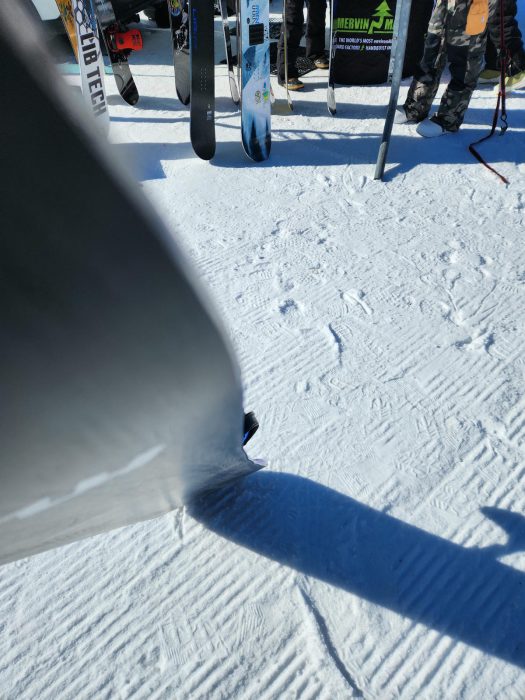
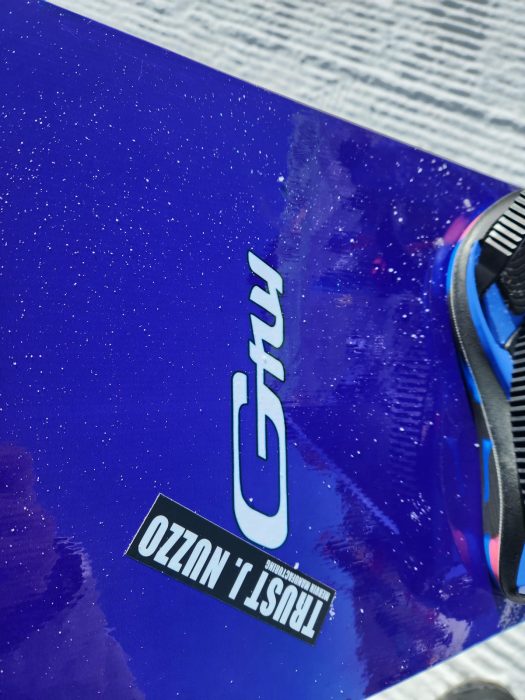
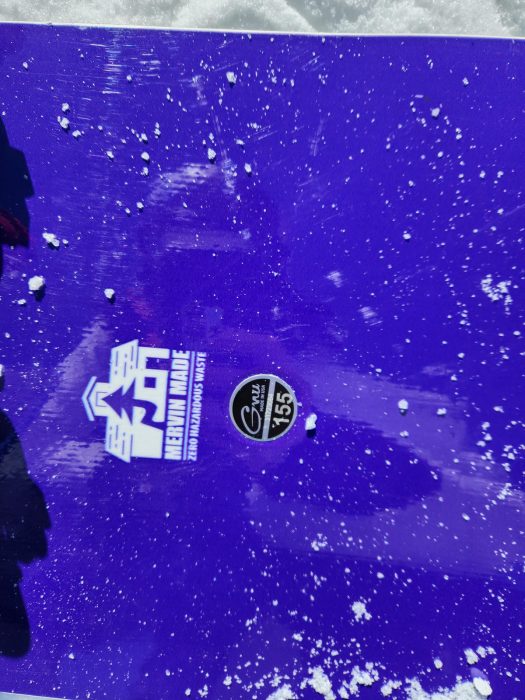
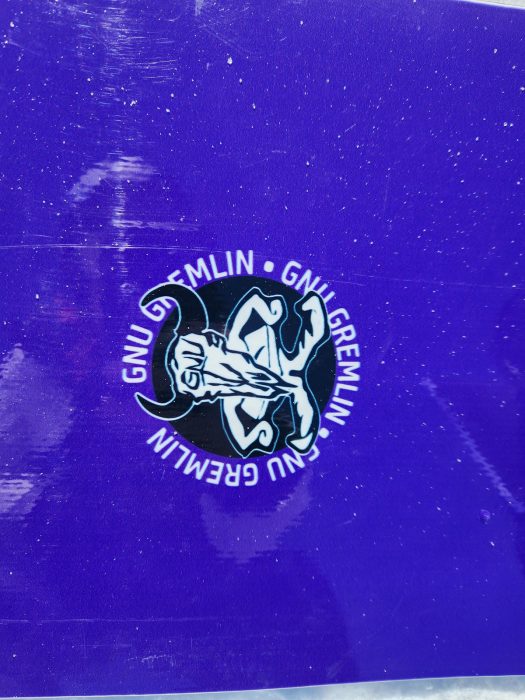
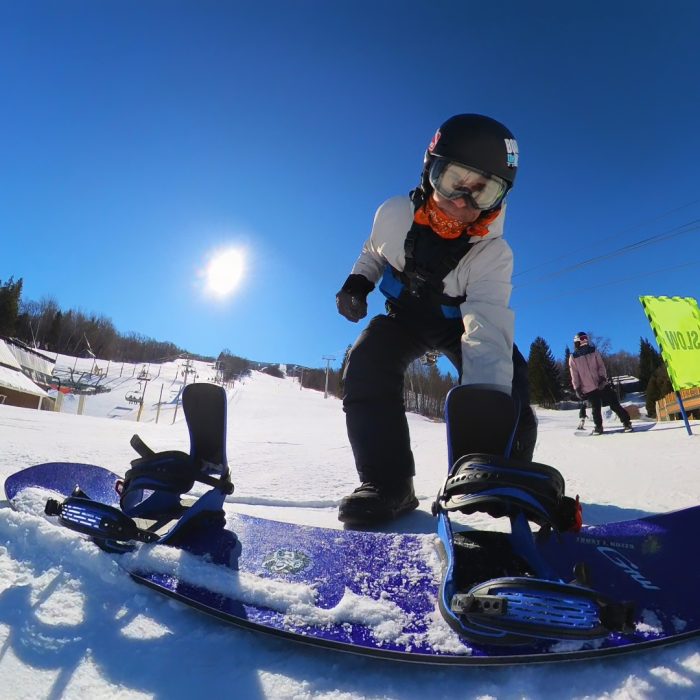
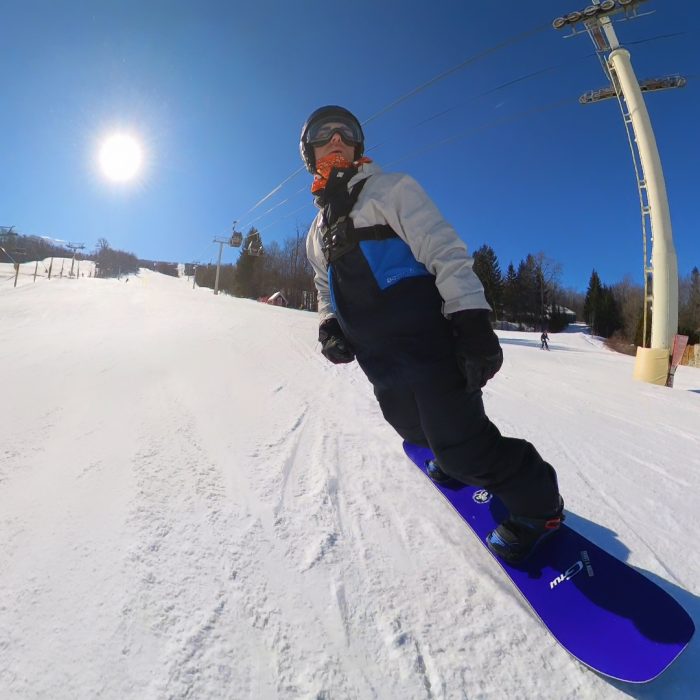
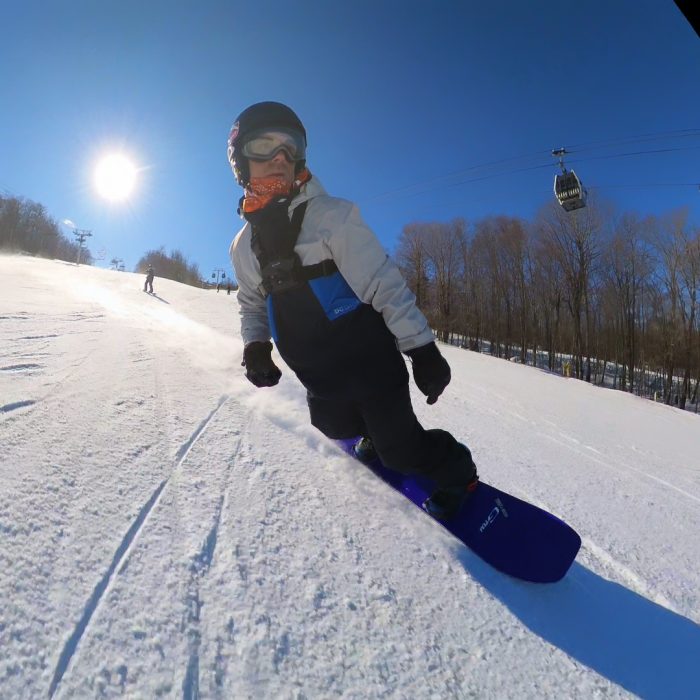
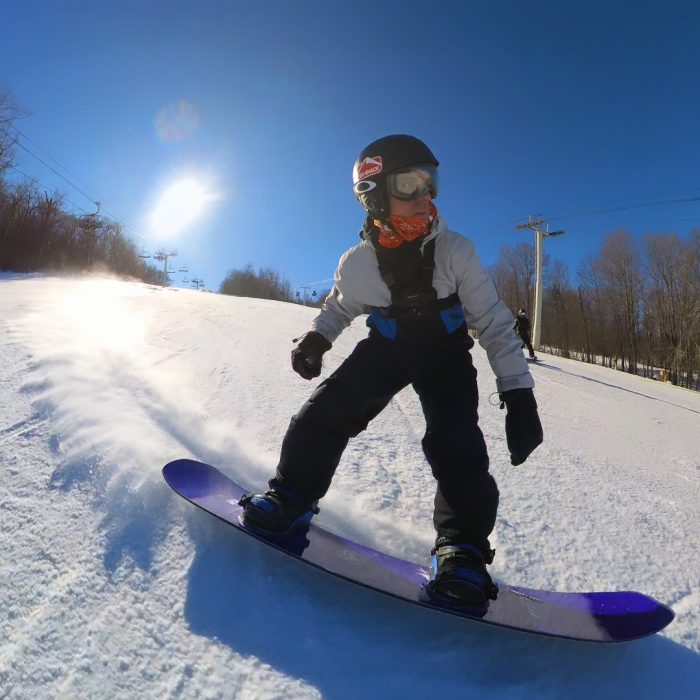
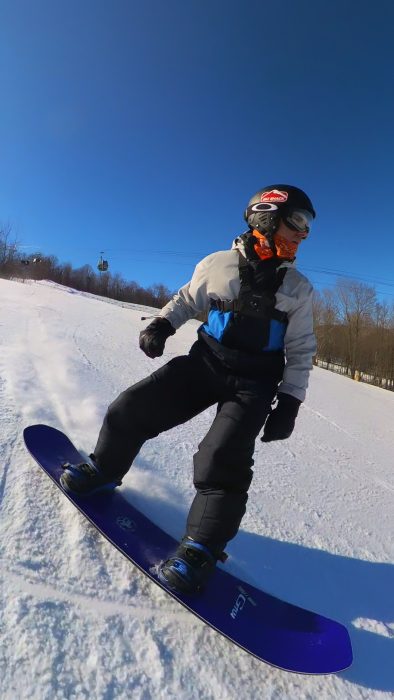
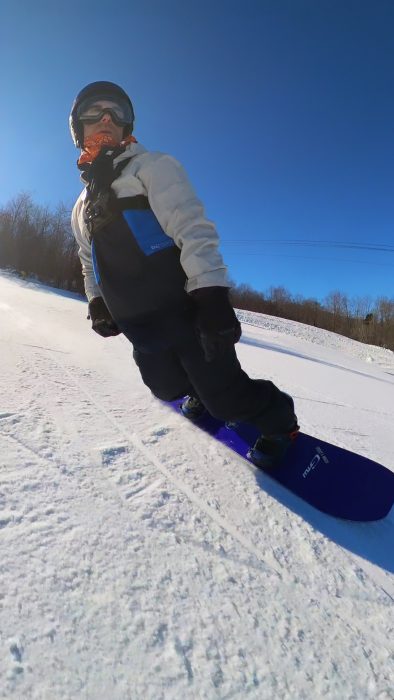
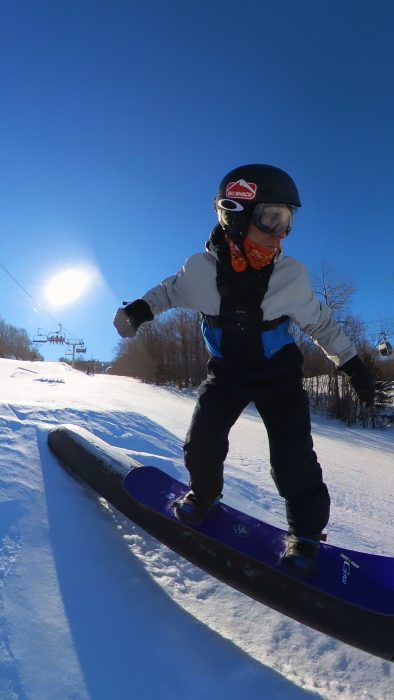
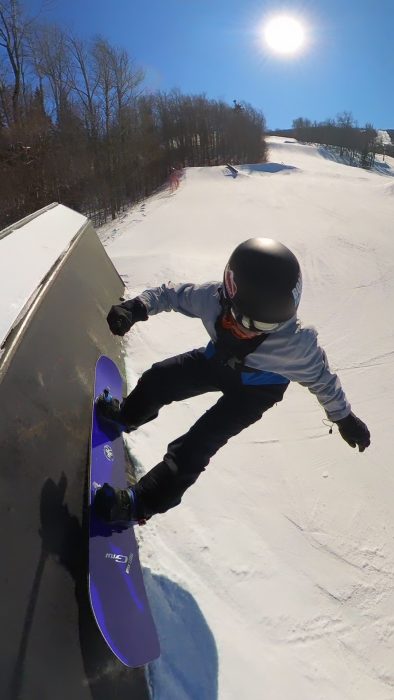
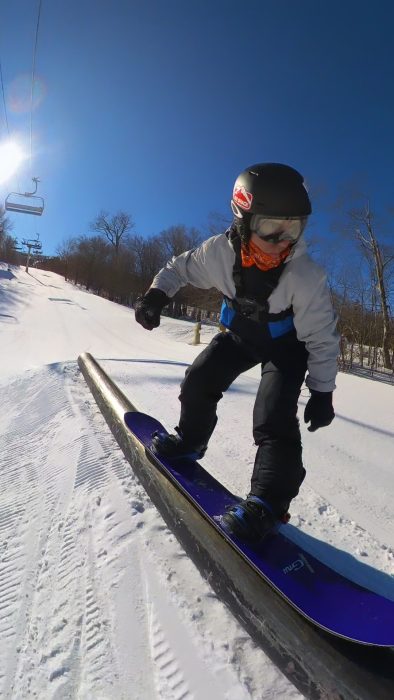
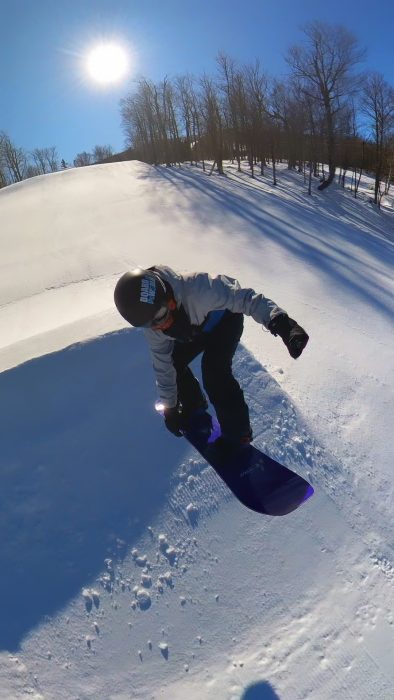
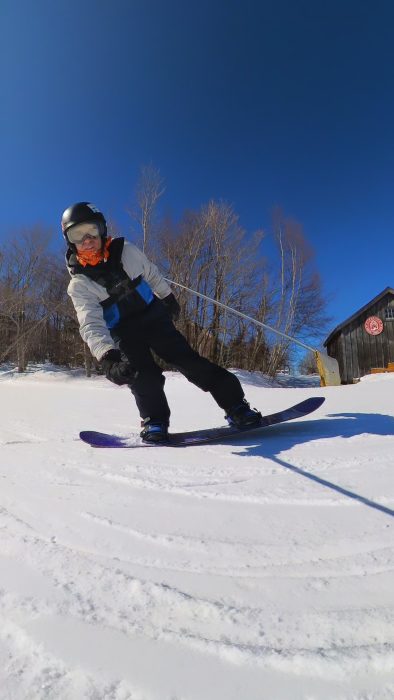
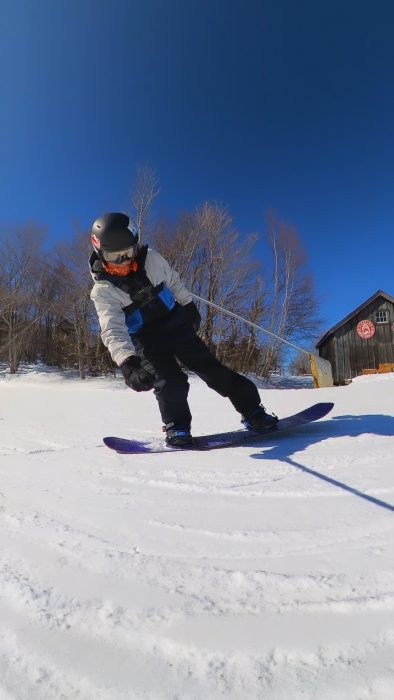
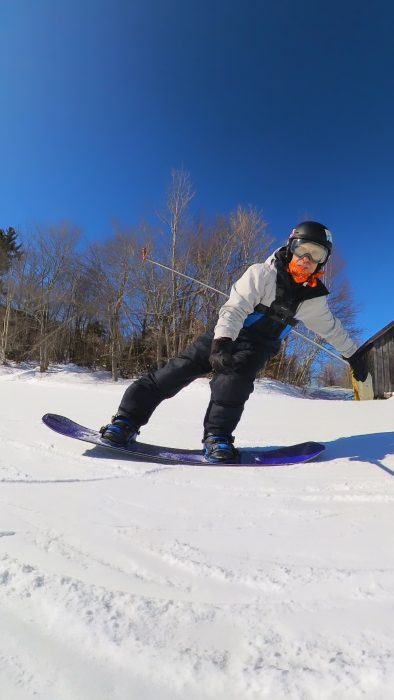
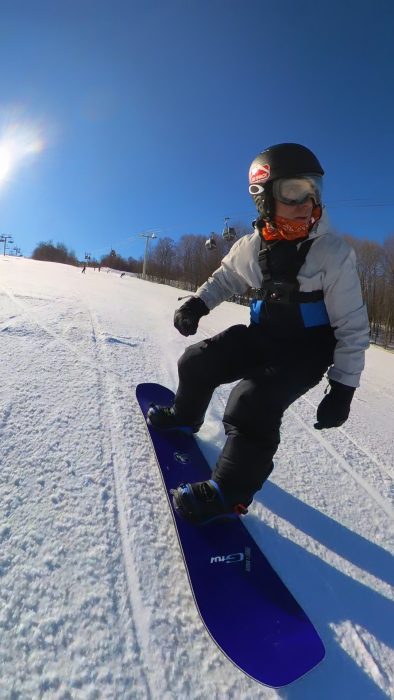
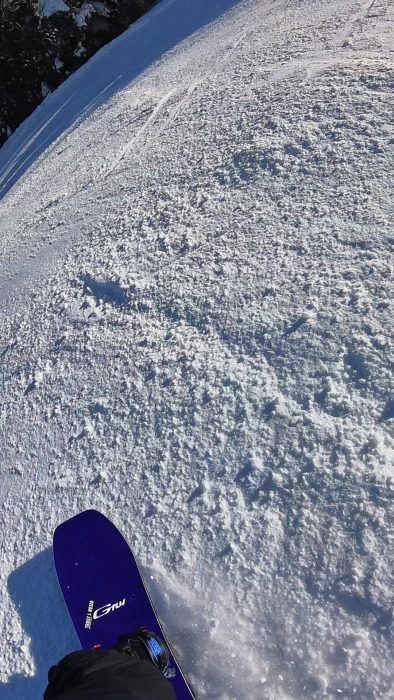
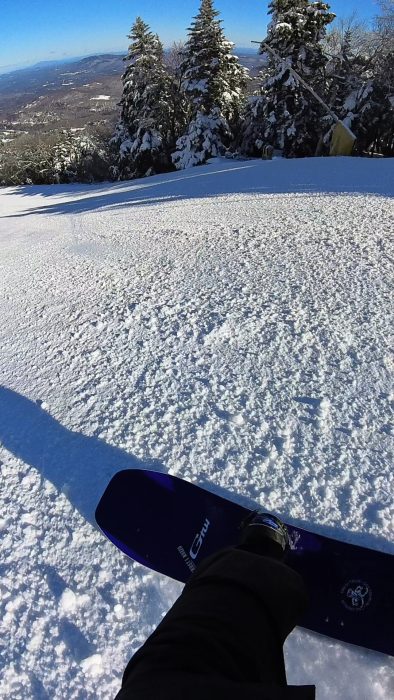
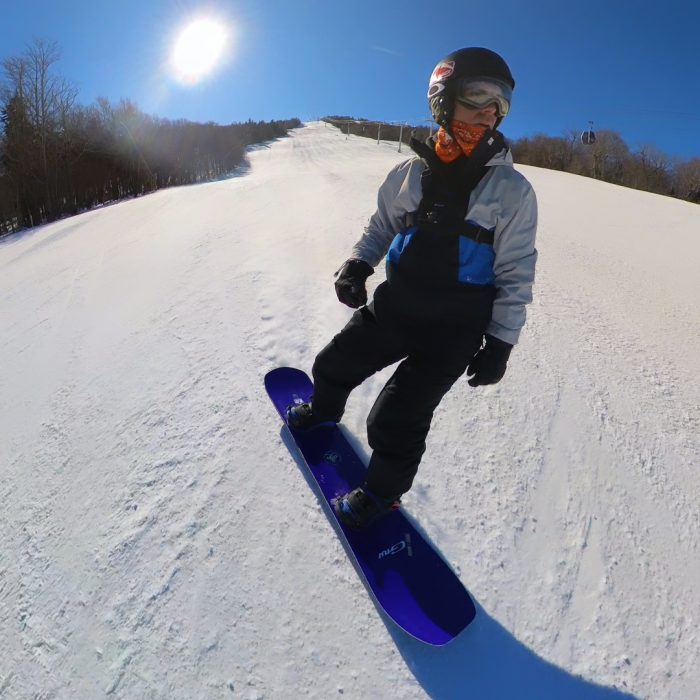
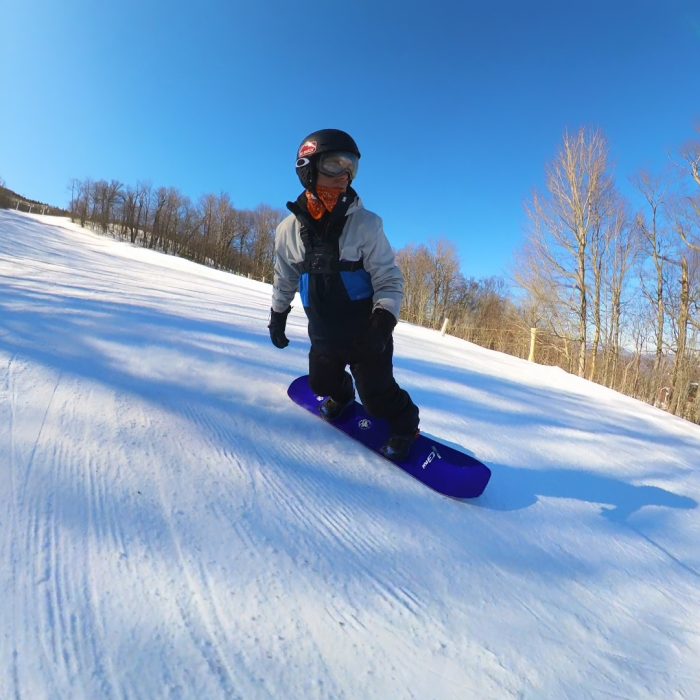
The GNU Gremlin vs. Lib Tech Orca


I own a Lib Tech Orca and thought the GNU Gremlin had a similar appeal to it. I actually think of the Lib Tech Orca as being the more laid-back cousin of the GNU Gremlin. The Gremlin is the noticeably more aggressive board, which makes the Orca ever slightly more versatile and forgiving.
What Makes the Lib Tech Orca and GNU Gremlin Similar?
- They both appeal to the resort rider who wants to go fast and have a board that can handle any type of terrain under their feet.
- They are both made by Mervin Manufacturing in the USA.
- They both have Magne Traction and grip to ice incredibly well.
- They both are volume-shifted (short wide) boards with a setback stance.
- They’re both capable of riding groomers or in powder.
What Makes the Lib Tech Orca and GNU Gremlin Different?
The large difference is in their profiles.
The Gremlin has the more camber dominant C3 profile.

This means that its a full camber arc between your feet with a very small, almost flattened rocker at the highest point of the arc. This profile gives the Gremlin its power, response, and pop while still being a little more forgiving than a board with a really deep camber profile.
Now the Lib Tech Orca is built on a setback C2X Profile.

This means it is a hybrid s-shaped (flipped 90 degrees to the right) profile where it has a shortened rocker arc between your feet with a longer camber arc after your back foot through the tail. The benefit is that it makes the board forgiving to steer torsionally while still offering the power and pop of a camber deck.
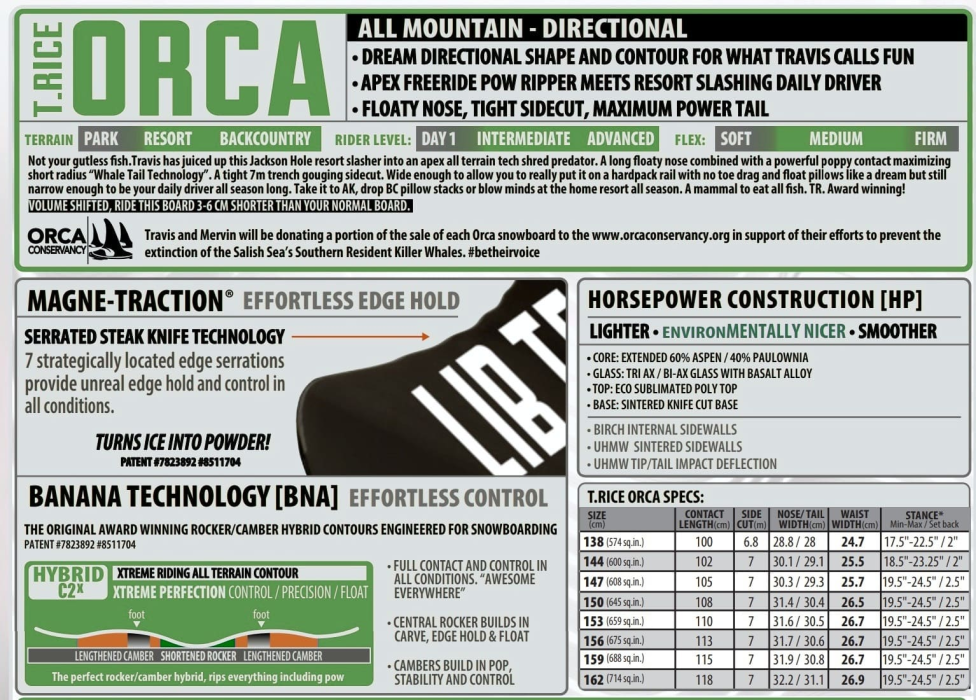
While they’re both very stable at speeds, the Gremlin is the more stable and precise board while the Orca is the more versatile, nimble and maneuverable option.
So, Which Board Should You Get?
- For Aggressive Charging on a Budget: The Gremlin. If your priority is to go fast, carve hard, and you want to save a bit of cash, the Gremlin is your pick. It’s built for speed and aggressive riding without breaking the bank (the Orca is $120 more expensive).
- For Icy Precision and Powerful Groomer Performance: Still the Gremlin. Yes, the Gremlin excels here too. It delivers exceptional edge hold on ice and a powerful, precise feel on groomed runs. If those are your key needs, stick with the Gremlin.
- For All-Mountain Versatility with Occasional Charging: The Orca. If you’re looking for a board that can handle a wide range of conditions and riding styles, including occasional high-speed runs, and you have a bit more budget for a higher quality base, the Orca is the better choice for you. It prioritizes versatility over aggressive riding.

Is the GNU Gremlin Worth It for Resort Riders (Even If There Isn’t a Lot of Powder)?
Yes. This board is great for carving groomers, hard pack, softer snow, and hitting side hits. It’s a versatile board that’s meant to go anywhere and do anything at your local resort.
Its volume-shifted design (wider for the average board of its same length) feels extremely stable and offers a balance between agility and stability. The reduced length makes the board feel more maneuverable and stable without sacrificing the float in powder. The Gremlin’s C3 camber profile also makes the board feel precise and controlled for charging hard while still being a fun board to ride in all types of conditions.
Full Specs of the Gremlin
| Size cm | 144 | 148 | 152 | 155 | 158 | 161 |
|---|---|---|---|---|---|---|
| Contact Length (cm) | 102 | 104 | 106 | 108 | 110 | 112 |
| Side Cut (m) | 6.6 | 6.8 | 7 | 7.2 | 7.5 | 7.7 |
| Nose / Tail Width (cm) | 30 / 28.8 | 30.3 / 29.1 | 30.9 / 29.7 | 31.3 / 30.1 | 32.1 / 30.8 | 32.6 / 31.3 |
| Waist Width (cm) | 25.5 | 25.8 | 26.1 | 26.4 | 27 | 27.5 |
| Stance Min-Max / Set Back | 18.5"-23.25" / 2" | 18.5"-23.25" / 2" | 19.25"-24" / 2" | 19.25"-24" / 2" | 19.25"-24" / 2" | 19.25"-24" / 2" |
| Stance Min-Max / Set Back | 47 – 59 / 5.1 cm | 47 – 59 / 5.1 cm | 48.9 – 60.9 / 5.1 cm | 48.9 – 60.9 / 5.1 cm | 48.9 – 60.9 / 5.1 cm | 48.9 – 60.9 / 5.1 cm |
| Flex Out of 10 | 6 | 6 | 6 | 6 | 6 | 6 |
| Weight Range lbs | 110+ | 120+ | 130+ | 140+ | 145+ | 150+ |
Is the GNU Gremlin Heavy?
No. It looks like the board that would have some weight to it, but this board felt about average to me.
Is the GNU Gremlin a One Board Quiver?
Maybe. However, I think it depends on how much you jib. If you don’t hit rails, it can be your one board to do everything. However, if you spend a lot of time in the park hitting features, you’ll probably want a twin for jibbing.
When Does the 2026 Gremlin Come Out?
The 2026 version of the GNU Gremlin is expected to hit shops around September 13, 2025, in the USA.
I got to get a sneak peek of the GNU Gremlin for 2026 at a recent tradeshow. Here’s what it looks like.

It looks to be the same specs as the 2025 version I tried, just with a teal topsheet.
There’s a Bent Metal Axtion binding that will be coming out in a teal color way to match it, too.
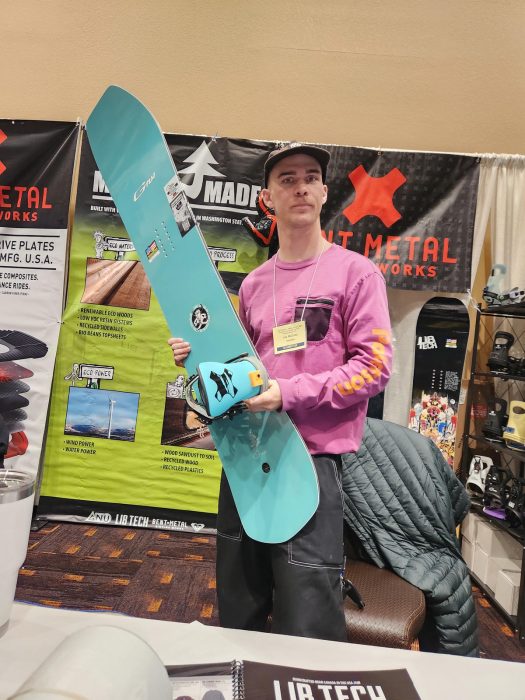
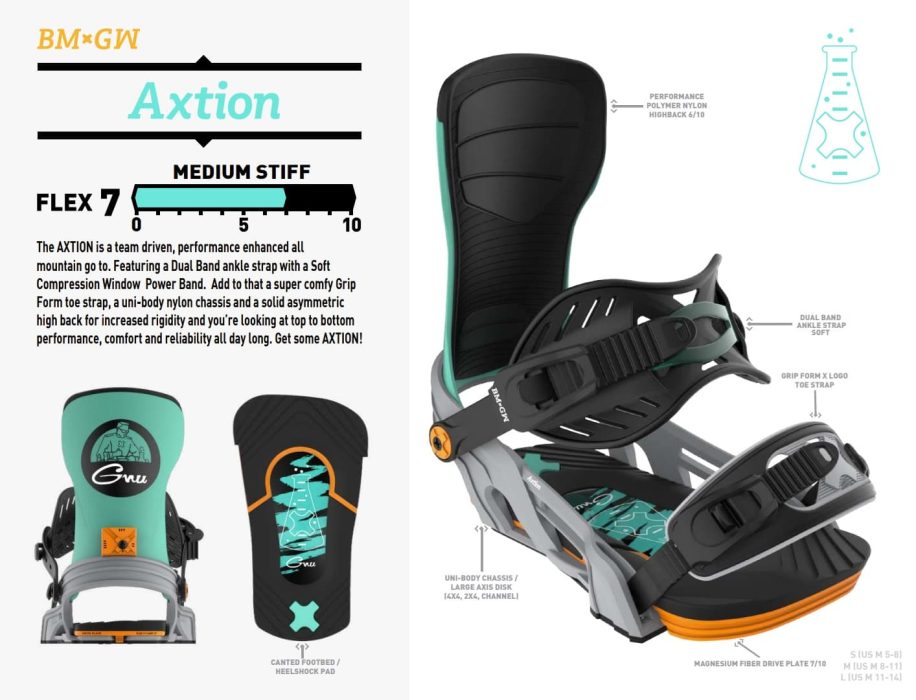
Which Other Bindings Pair With the Gremlin?
In addition to the Bent Metal Axtion bindings, this board pairs well with the Bent Metal Transfer or Union Ultra Bindings.
I rode this board with my Union Ultra Bindings.
Where to Buy the Gremlin
The Gremlin is sold at Evo, Amazon, and Steep and Cheap.

Steve Weber is the passionate snowboarder, skateboarder, and author behind Board of the World. He understands that most gear reviews focus on having the perfect snow conditions, but his testing methodology is different. Living in Pennsylvania, Steve describes exactly how a board performs when the conditions aren’t perfect. His reviews cover performance on ice, hardpack, and flat-out brick conditions. In other words, he reviews boards for the conditions that East Coast riders actually face.
Bringing 27 years of East Coast snowboarding and 21 years of skateboarding experience, Steve is a 42-year-old intermediate park rider. His recommendations are informed by decades of battling icy conditions, ensuring every review accounts for the board’s performance on the roughest of terrain.
For the last five years, Steve has poured his passion into writing in-depth, unbiased reviews that help riders make informed decisions about the gear they’ll use. He also works part-time at a snowboard shop in Northeastern Pennsylvania, which gives him a direct line to learning about the new gear tech months in advance. When he’s not writing reviews, Steve is often found riding at Montage Mountain and testing out new boards.
Steve’s goal with Board of the World is simple: to help every reader find the right gear so they can have fun outside from the first time they use it.

